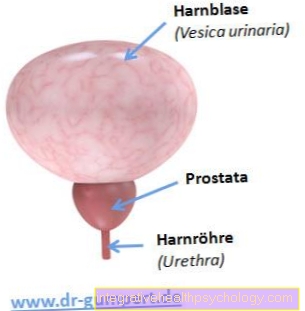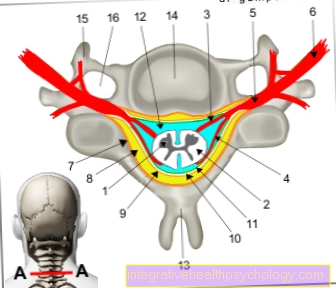Yoga in pregnancy
Introduction - Yoga in Pregnancy
Yoga is a holistic movement theory from India, which is supposed to bring the body, mind and soul into balance in order to find inner peace. Yoga for pregnant women is an optimal mix of exercise and relaxation to keep the body fit and prepare for the birth. This is a very good sport during pregnancy for those who are experienced in yoga as well as beginners.

How long can I practice yoga during pregnancy?
Since every pregnancy is different and individual, it should be clarified with a doctor before starting yoga whether the pregnancy will go off without complications and whether sport can be done. In general, yoga is about relaxation and light muscle exercises. In pregnancy it is very important to listen to the body's wellbeing during exercises. If there are no problems during pregnancy and the doctor has no concerns, yoga can be practiced from the first day of pregnancy to the day of birth, especially for those who are experienced in yoga. For yoga beginners, it is recommended to wait for the first 3 months of pregnancy, as the risk of complications is higher during this time.
In many yoga schools, the exercises are adapted directly to the pregnancy. Since the body goes through further changes as the pregnancy progresses, it is also important to coordinate the exercises accordingly.
However, it is important to always pay attention to the signals from the body and to adapt the intensities to the pregnancy. There are many yoga classes for pregnant women that optimally address the needs of the body.
You can find out more about the topic here: Exercise during pregnancy
What Are The Dangers And Risks Of Yoga In Pregnancy?
Compared to many other sports, yoga poses only a low risk during pregnancy. Yoga helps to relax and relieves the body, especially in the back area. For pregnant women in the first trimester who have already done a lot of sport before pregnancy, it is important to adjust the intensity of sport to the pregnancy and to clarify with a doctor. Even with yoga experienced, the intensity must be adapted to the changes in the body during pregnancy in order not to harm the baby. Special yoga courses for pregnant women have an optimal selection of exercises that do not harm mother and child, but only tax them for their well-being.
Yoga and other sporting activities are not recommended if you have the following symptoms:
-
High blood pressure in pregnancy
-
Heart and circulatory problems
-
Placenta is deep
-
Anemia and bleeding
-
Open cervix
However, since yoga not only includes physical exercises, but also breathing techniques and relaxation exercises, a doctor should be consulted, especially in the event of complications during pregnancy.
Read more about the topic here: High risk pregnancy
Which exercises / positions should I no longer do?
In general, the intensity of the exercises should be reduced significantly during pregnancy compared to normal yoga. The individual exercises should also not be held for too long. These exercises in particular should be avoided during pregnancy:
-
too intense pranayama (breathing exercises)
-
Exercises in the prone position
-
intensive abdominal muscle exercises (abdominal muscle training during pregnancy)
-
Exercises that involve jumps
-
Twists in the abdomen
-
Pinching the abdominal area
-
Hollow back
-
Power yoga
-
Hot yoga
The change that the body goes through during pregnancy creates a new center of gravity. The exercises that involve bending over or leaning back should be done carefully and gently.
Exercises that are suitable for pregnant women can also make some women feel uncomfortable. It is very important to listen to your own body and skip such exercises, as yoga for pregnant women is about relaxation, not about testing limits.
Find out more about the topic: Pregnancy gymnastics
Why should I do yoga during pregnancy?
Since yoga is mainly about relaxation and light muscle exercises, this can be an ideal companion during pregnancy to prevent common pregnancy symptoms such as back, neck and shoulder pain as well as exhaustion, nausea and heartburn.
Read more about the topic here: Back training during pregnancy
The tendons, ligaments and muscles are also heavily stressed during pregnancy and childbirth. Regular, gentle stretching of the tendons and muscles makes the body more relaxed and fitter and can thus facilitate the birth. Through targeted yoga positions (asanas) that focus on the hip and pelvic floor area or targeted breathing exercises (pranayama), the birth can also be made easier and the body strengthened.
Find out more about: Stress in Pregnancy
How do I find a facility that offers pregnancy yoga?
Many yoga schools or fitness studios offer yoga classes for pregnant women. The online offer is very large and you should find it quickly.
Especially as a newcomer to yoga, it is strongly advised to attend a course in order to learn optimal exercises for pregnancy and not to take over yourself. Even those with experience of yoga are advised to discuss exercises with a yoga teacher that do not harm mother and child and that contribute to relaxation.
You can find more information on the subject in the following article: Pregnancy courses and Water aerobics during pregnancy
Editor's recommendations
You can find a lot more information on the subject in the following articles:
- Diet in Pregnancy
- Vitamins in Pregnancy
- Pregnancy process
- yoga





























